A North Korean ICBM is a danger, not a game changer
Posted By Brad Glosserman on August 2, 2017 @ 13:45

North Korea’s determination to acquire an intercontinental missile capability continues to alarm US officials and experts. Secretary of State Rex Tillerson noted that last week’s missile test—now acknowledged to be an ICBM—‘represents a new escalation of the threat to the United States, our allies and partners, the region and the world’. General Mark Milley, chief of staff of the US Army, warned the day before the test that North Korea is ‘the single most dangerous threat facing the international community right now’.
They are right to raise the dangers of Pyongyang’s relentless drive—28 missile tests in the last year alone—to be able to reach out and touch the US. But the claim that a North Korean ICBM capability is a ‘game changer’—the description of General Vincent Brooks, commander of US Forces Korea, along with numerous other analysts and planners—goes too far, and is in fact dangerous. We should abandon the rhetoric that a North Korean ICBM fundamentally changes the security landscape: it is incorrect and sends the wrong signal to allies and adversaries.
North Korea believes that its ability to deliver a nuclear warhead to US soil transforms the strategic equation on the Korean peninsula, concluding that it can then threaten the US and its allies, or force Washington to accept Pyongyang’s goals. Pyongyang assesses the prospect of ‘trading Seattle for Seoul’ will decouple the US from its allies, forcing Washington to stand down or aside in a crisis. That logic is mistaken.
Pyongyang should instead recall that the US faced off against a far more formidable opponent during the Cold War and even the threat of a global holocaust did not deter Washington from honouring its alliance commitments. In his comments last week, General Milley concluded that ‘war on the Korean Peninsula would be … horrific’ but that the US and South Korea ‘would utterly destroy the North Korean military’. (And remember, North Korea does not need a nuclear weapon to wreak havoc on the South, nor does its possession of a nuclear weapon change any outcomes.)
Calling an ICBM a ‘game changer’ makes some sense. It represents a new North Korean threat to the US and the rhetoric alerts both allies and adversaries that Washington is paying attention and the development demands a response. In that sense, the language may be directed at Beijing rather than Pyongyang: it aims to mobilise China to do more to address the North Korean threat or face a potentially more destabilising US reaction (such as stronger sanctions, missile defence deployments, or even pre-emption).
But the disadvantages of using that language outweigh any possible benefit. First, there is the risk that it will encourage Pyongyang to double down on its current efforts. After all, the US insistence that an ICBM changes the strategic equation is precisely the result that North Korea wants. Washington is validating that logic and affording Pyongyang the status it seeks.
Second, and a consequence of that first point, there is the very real possibility that Pyongyang will miscalculate the leverage it has in a crisis and assume that its nuclear capability renders it immune to a US strike. The chances of escalation will be increased.
Third, and perhaps most significant, that rhetoric makes our allies nervous. Americans may believe that their warnings reassure allies that Washington is paying attention, but this language makes them think the US is overly sensitive to this particular threat. It is precisely because Washington puts so much emphasis on the threat to the US homeland that decoupling seems more real. At a recent Pacific Forum CSIS trilateral (US-Japan-ROK) meeting [1] that focused on responding to a Korean peninsula crisis, participants from Japan and the ROK expressed anxiety about US sensitivity to this particular capability. They worry that the US might move pre-emptively in a crisis—sparking a real war—or hesitate precisely because of this new threat. Similar concerns were voiced by Japanese politicians last week at a conference in Tokyo.
The solution is not to ignore this threat, but to change the emphasis. The focus of US concern should not be a missile’s range, but its payload. The US should state clearly that any North Korean missile—no matter what the range—that is capable of delivering a nuclear weapon will force a US response. By focusing on the shared threat, this message will reinforce US ties to its allies, unlike the emphasis on an ICBM which differentiates between the two intended targets. Nothing is or should be further from the truth. A North Korean ICBM is a danger, but it does not transform the strategic equation.
This article originally appeared on the Pacific Forum CSIS [2] site.
Article printed from The Strategist: https://aspistrategist.ru
URL to article: /north-korean-icbm-danger-not-game-changer/
URLs in this post:
[1] meeting: https://www.csis.org/events/fourth-us-rok-japan-trilateral-strategic-dialogue
[2] Pacific Forum CSIS: https://www.csis.org/analysis/pacnet-54-north-korean-icbm-danger-not-game-changer
Click here to print.